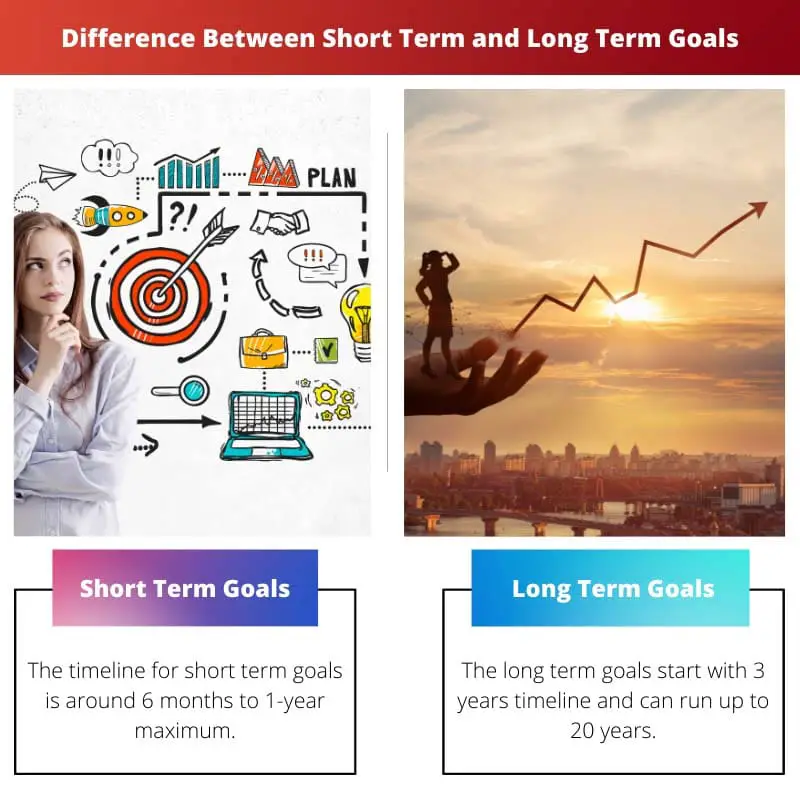Short-term goals are achievable within weeks or months, providing immediate results. Long-term goals, on the other hand, require extended time frames, years, and involve sustained effort towards more significant accomplishments. Balancing both is crucial for holistic personal and professional growth.
Key Takeaways
- Short-term goals are achievable within a relatively brief period, such as days or months, while long-term goals require a more extended period, such as years or even decades.
- Short-term goals serve as stepping stones toward accomplishing long-term goals, providing motivation and momentum along the way.
- Short- and long-term goals should be specific, measurable, attainable, relevant, and time-bound (SMART) to increase the likelihood of success.
Short Term vs Long Term Goals
The difference between short-term and long-term goals is that short-term goals are for less than 1 year, and long is for 5 years or more.

The best part of having goals is that you can start on a goal at any age in your life. While creating a goal for yourself, you must check that the goal is realistic.
If you create a goal that is difficult for you to complete, you will also get demotivated to complete your other goals.
Comparison Table
| Feature | Short-Term Goals | Long-Term Goals |
|---|---|---|
| Timeframe | Weeks, months, up to a year | Years, decades, or even a lifetime |
| Specificity | More specific and actionable | More broad and aspirational |
| Measurability | Clearly measurable metrics for progress | Often less easily measurable |
| Flexibility | More flexible and adaptable due to shorter timeframe | May require adjustments but less flexible due to long-term nature |
| Motivation | Immediate results provide frequent bursts of motivation | Requires patience and long-term vision for sustained motivation |
| Sense of Accomplishment | Frequent feelings of achievement due to quicker completion | Provides a sense of purpose and direction |
| Examples | Learn a new skill, save for a vacation, pay off a debt | Graduate from college, start a business, own a home |
What are Short Term Goals?
Short-term goals are objectives that individuals or organizations aim to achieve within a relatively brief period, spanning weeks to a few months. These goals serve as stepping stones toward larger, overarching objectives. They are crucial for maintaining focus, motivation, and tracking progress.
Characteristics of Short Term Goals
- Timeframe: Short-term goals are defined by their immediacy, requiring completion in a concise time frame. This allows for quick assessment of progress and adjustments to the overall plan.
- Specificity: They are highly specific, with clearly defined and measurable outcomes. This specificity helps in setting clear expectations and facilitates effective monitoring.
- Attainability: Short-term goals are realistic and attainable within the given time constraints. Achieving these smaller milestones boosts confidence and motivation for tackling more extensive objectives.
- Impact: While short-term goals may not represent the final outcome, they contribute significantly to the overall success of a project or the attainment of a larger goal.
Examples of Short Term Goals
- Project Milestones: Breaking down a project into smaller, manageable tasks and setting deadlines for each component.
- Skill Development: Acquiring specific skills or knowledge within a defined timeframe to enhance professional or personal capabilities.
- Financial Targets: Meeting monthly savings goals or achieving short-term financial objectives, such as reducing debt.
- Fitness Objectives: Setting short-term fitness goals, such as running a certain distance in a specific time or achieving weight loss targets.

What are Long Term Goals?
Long-term goals are aspirations that extend beyond immediate actions, spanning an extended time horizon, measured in years. These goals provide a roadmap for personal and professional development, guiding individuals towards significant achievements and sustained success.
Characteristics of Long-Term Goals
- Time Frame: Long-term goals require a substantial amount of time to achieve, ranging from several years to even decades. They involve persistent effort and dedication over an extended period.
- Complexity: These goals are complex and multifaceted, involving various milestones and sub-goals. They may encompass multiple dimensions of life, such as career, education, relationships, and personal development.
- Significance: Long-term goals are meaningful and impactful, contributing to one’s overall sense of purpose and fulfillment. They align with core values and aspirations, reflecting a deep-seated desire for lasting accomplishments.
- Planning and Strategy: Achieving long-term goals necessitates careful planning and strategic thinking. Individuals must create a roadmap, break down the goal into manageable steps, and adapt their approach as circumstances evolve.
Examples of Long-Term Goals
- Career Advancement: Attaining a senior leadership position, starting a business, or becoming an industry expert are common long-term career goals.
- Education and Skill Development: Pursuing advanced degrees, acquiring specialized skills, or mastering a particular field are examples of long-term goals in education and personal development.
- Financial Independence: Accumulating wealth, investing for the future, or achieving financial stability over the long term are common financial goals.
- Health and Wellness: Long-term health goals may include maintaining a healthy lifestyle, achieving and sustaining a target weight, or training for a specific fitness milestone.
- Relationships and Family: Building lasting relationships, starting a family, or fostering a supportive social network can be long-term goals that contribute to personal happiness.

Main Differences Between Short-Term and Long-Term Goals
- Time Horizon:
- Short-term goals are achievable within a relatively brief timeframe, weeks or months.
- Long-term goals span an extended period, years, requiring sustained effort and commitment.
- Immediate vs. Gradual Impact:
- Short-term goals yield immediate, tangible results and impact.
- Long-term goals contribute to gradual, sustained growth and significant accomplishments over time.
- Scope and Complexity:
- Short-term goals are specific, focused, and less complex, addressing immediate needs or tasks.
- Long-term goals tend to be more comprehensive, involving multifaceted planning and addressing broader aspects of life or career.
- Flexibility and Adaptability:
- Short-term goals allow for more flexibility and adaptability, as they can be adjusted based on immediate circumstances.
- Long-term goals may require strategic planning and adaptability to changing conditions, but adjustments are made with a broader perspective.
- Motivation and Persistence:
- Short-term goals provide quick boosts of motivation, helping individuals stay focused on immediate tasks.
- Long-term goals demand sustained motivation and persistence over an extended period, requiring a deeper commitment to overcome challenges.
- Examples:
- Short-term goals include completing daily tasks, meeting deadlines, or achieving specific milestones in a project.
- Long-term goals encompass aspirations like career advancement, education, financial stability, or achieving significant personal milestones.
- Measurement of Success:
- Success in short-term goals is easily measurable through completion of tasks or attainment of immediate objectives.
- Success in long-term goals is measured by achieving overarching objectives and milestones over an extended period, contributing to a broader sense of accomplishment.




